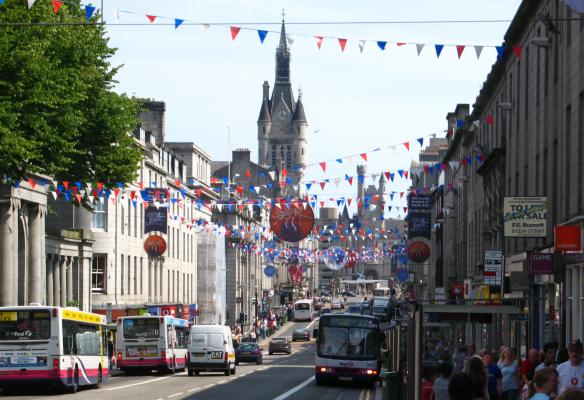The value of sales through stores open more than a year was 3.5per cent lower in March than the same month last year.

Looking at sales through all stores the figure was down by 1.9per cent, which is the biggest fall since the British Retail Consortium began collecting figures in 1995.
The high street has suffered with figures showing sales were 3.5 per cent lower in March than the same month last year
Families are cutting back on the amount of food they buy, clothes, curtains and carpets and other big ticket items for the home.
Separate research from Visa highlights cuts in holidays, eating out, going to concerts and major sporting events.
The fall in the value of goods sold through the tills is all the more shocking because rising prices in the past year - with inflation of 4.4per cent - would normally deliver an automatic increase.
The crisis has been demonstrated by the fact that household name chains like HMV, the Dixons group, Home Retail, which includes Argos and Homebase, and Mothercare have issued profits warnings.
Profit warnings: HMV is just one of a host of major companies that has warned of a drop in sales
The poor March figures were partly driven by the fact that Easter and associated spending has shifted to April this year. However, the BRC said this is not the main factor.
It said: ‘Like-for-like food sales fell well below their year-earlier level and non-food sales showed an even larger decline.
‘Consumers’ underlying uncertainty about jobs and incomes, as well as the later Easter, hit both. Big-ticket home and furniture purchases suffered most and sales achieved were often promotion-led.’
The BRC director general, Stephen Robertson, said: ‘This is the worst drop in total sales since we first collected these figures in 1995.
Fact
"Heart Finance is an independent finance broker which was founded to search the entire market in order to help you find the best deal you possibly can.
Do you find comparison sites confusing? Want to save time AND money? Get the best deals from BIG brand names? At Heart Finance you are in the right place! Browse everything from Payday Loans to Insurance, to Utilities, even shopping with cash back, in your one stop money shop"
‘Non-food retailers were particularly hard-hit. This is strong evidence of the pressure customers and traders are under.
‘This year’s later Easter is a factor but this fall goes way beyond anything that can be explained by that alone.’
He said families and others are clearly tightening their belts and making real changes to lifestyles and spending habits.
Rising taxes, such as the increase in VAT to 20 per cent in January and the recent increase in National Insurance, are putting pressure on consumers.
‘Uncomfortably high inflation and low wage growth have produced the first year-on-year fall in disposable incomes for 30 years,’ he said.
‘These pressures aren’t going away and the arrival of higher National Insurance is likely to compound them in the immediate future.’
He warned any increase in interest rates could do real damage to family finances and the wider economy.
‘The next interest rate decision is a difficult balancing act for the Bank of England but, for now, supporting our weak economy must be the priority,’ he said.
‘Inflation is coming mainly from temporary and external price shocks - VAT, world commodity prices and the weak pound - not wage or consumer-driven increases. Increasing interest rates would do more harm than good.’
The Centre for Economics and Business Research suggests the average household is the equivalent to £910 a year worse off than in 2009.
It says the fall in family spending power over 2010 and 2011 is the worst since 1921.
Fact
" Check Heart Finance 's Shopping with Cashback! You can shop online from your favourites sites ( ebay, amazon and many many other ) and get rewarded with cash back making the VAT and cost of living 's rise much less painful."
‘The UK is now seeing a bigger fall in real household disposable incomes than in the 1930s and the biggest fall excluding WW2 and the General Strike since 1921,’ it said.
She said: ‘We have seen an emergence of new, lower spending patterns since the middle of January, which are currently continuing to trend downwards.
‘Many retailers will not be able to sustain this ongoing weakness in demand beyond the short term and are hoping for some good news around the extended bank holiday period and a feel-good factor driven by the royal wedding.
‘However, as disposable income continues to fall, without reducing saving or increasing borrowing – which would oppose current trends – this will not be possible.’
No comments:
Post a Comment